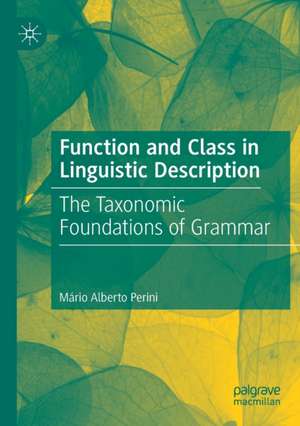Function and Class in Linguistic Description: The Taxonomic Foundations of Grammar
Autor Mário Alberto Perinien Limba Engleză Paperback – 23 sep 2022
This book deals with the traditional problem of the classification of linguistic units, with a primary focus on word classes. The approach is descriptive rather than theoretical, and is based on the use of distinctive features analogous to the ones used in phonology, which entails a radical reworking of the traditional classification. The first part presents some basic notions such as the use of distinctive features and the role of word classes in grammar; classification by prototypes; and the use of world knowledge as a resource to assign thematic relations to constituents in the sentence. In the second part, some descriptive problems are examined, namely the classification of verbs according to valency; connectives, adverbs, and the internal constituents of the NP; and the classification of units larger than words. This book will be of use as a guide for linguists working on the description of natural languages, as well as a resource for students on courses in linguistic theory and description.
| Toate formatele și edițiile | Preț | Express |
|---|---|---|
| Paperback (1) | 781.31 lei 6-8 săpt. | |
| Springer International Publishing – 23 sep 2022 | 781.31 lei 6-8 săpt. | |
| Hardback (1) | 786.52 lei 6-8 săpt. | |
| Springer International Publishing – 22 sep 2021 | 786.52 lei 6-8 săpt. |
Preț: 781.31 lei
Preț vechi: 952.81 lei
-18% Nou
Puncte Express: 1172
Preț estimativ în valută:
149.55€ • 162.50$ • 125.70£
149.55€ • 162.50$ • 125.70£
Carte tipărită la comandă
Livrare economică 21 aprilie-05 mai
Preluare comenzi: 021 569.72.76
Specificații
ISBN-13: 9783030781750
ISBN-10: 3030781755
Pagini: 338
Ilustrații: XII, 338 p. 3 illus.
Dimensiuni: 148 x 210 mm
Greutate: 0.42 kg
Ediția:1st ed. 2021
Editura: Springer International Publishing
Colecția Palgrave Macmillan
Locul publicării:Cham, Switzerland
ISBN-10: 3030781755
Pagini: 338
Ilustrații: XII, 338 p. 3 illus.
Dimensiuni: 148 x 210 mm
Greutate: 0.42 kg
Ediția:1st ed. 2021
Editura: Springer International Publishing
Colecția Palgrave Macmillan
Locul publicării:Cham, Switzerland
Cuprins
Chapter 1: Introduction
Part I: General Principles
Chapter 2: Categorization and knowledge
Chapter 3: Form and meaning
Chapter 4: Word classes
Chapter 5: Classes and the grammar
Chapter 6: Prototypes
Chapter 7: Assignment by default.- Part II: Descriptive Application
Chapter 8: Classification of verbs
Chapter 9: Constructions of directional motion: a guided tour of valential complexity
Chapter 10: Functions and classes in the NP
Chapter 11: Towards a taxonomy of connectives
Chapter 12: Adverbs and their relatives
Chapter 13: Features and grammatical description
Chapter 14: Semantic correlations and syntactic features
Chapter 15: Beyond the lexicon
Chapter 16: Summary
Notă biografică
Mário A. Perini is Professor Emeritus at the Universidade Federal de Minas Gerais (UFMG), Belo Horizonte, Brazil. He is the author of Describing Verb Valency (2015) and Thematic Relations (2019).
Textul de pe ultima copertă
This book deals with the traditional problem of the classification of linguistic units, with a primary focus on word classes. The approach is descriptive rather than theoretical, and is based on the use of distinctive features analogous to the ones used in phonology, which entails a radical reworking of the traditional classification. The first part presents some basic notions such as the use of distinctive features and the role of word classes in grammar; classification by prototypes; and the use of world knowledge as a resource to assign thematic relations to constituents in the sentence. In the second part, some descriptive problems are examined, namely the classification of verbs according to valency; connectives, adverbs, and the internal constituents of the NP; and the classification of units larger than words. This book will be of use as a guide for linguists working on the description of natural languages, as well as a resource for students on courses in linguistic theory and description.
Mário A. Perini is Professor Emeritus at the Universidade Federal de Minas Gerais (UFMG), Belo Horizonte, Brazil. He is the author of Describing Verb Valency (2015) and Thematic Relations (2019).
Caracteristici
Proposes basic principles whereby lexical items, and also larger constituents, can be classified
Shows how the relation between linguistic elements and cognitive representations includes grammatically defined semantic roles
Demonstrates a way to make use of the notion of "prototype" in the analysis of language, without having recourse to vague and poorly defined relations between items
Shows how the relation between linguistic elements and cognitive representations includes grammatically defined semantic roles
Demonstrates a way to make use of the notion of "prototype" in the analysis of language, without having recourse to vague and poorly defined relations between items
